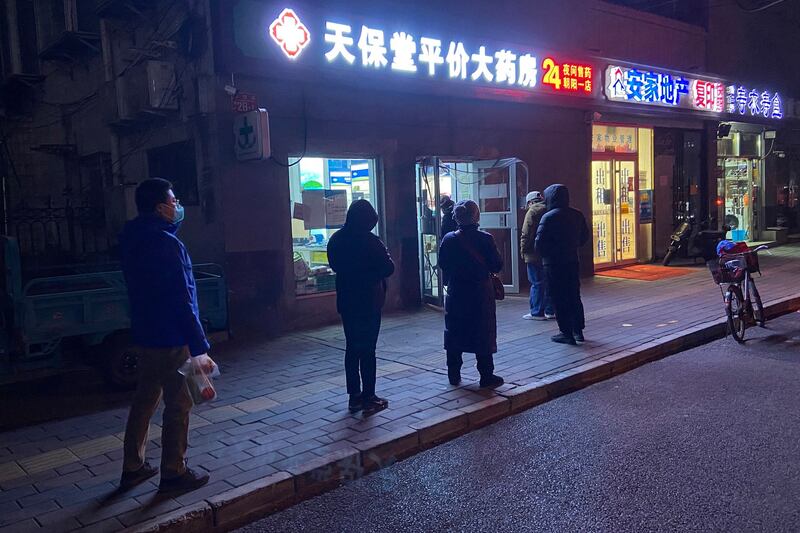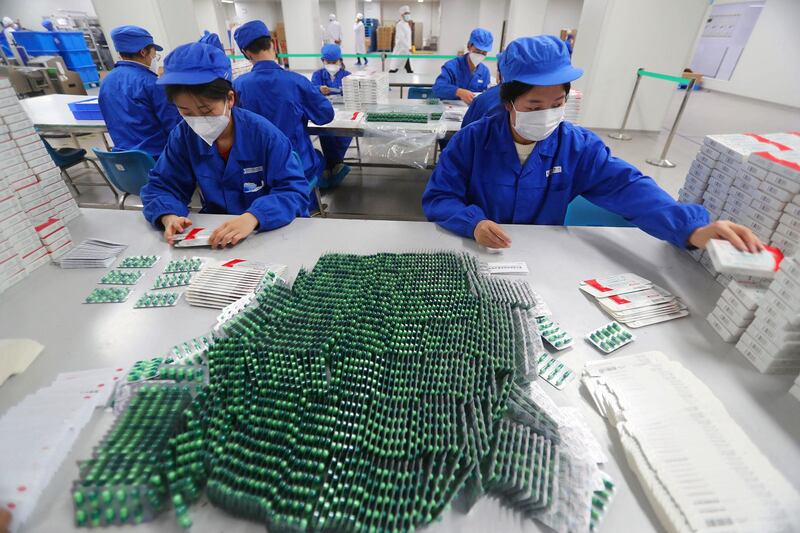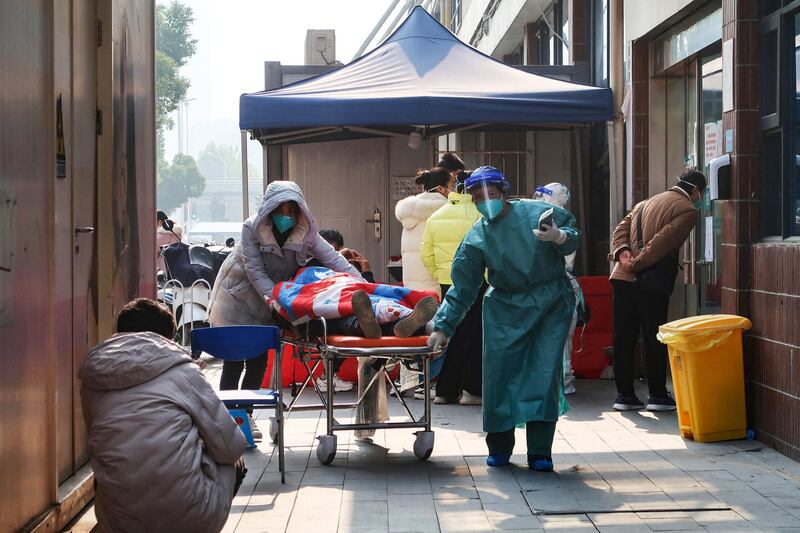China on Tuesday paused the use of a hugely unpopular “Health Code” smartphone app tracking citizens' COVID-19 status as well as their movements in and out of high-risk areas even as a wave of new cases spread across the country.
Reuters cited a Chinese government official as saying on Monday night that visits to fever clinics had risen to 22,000 per day, a 16-fold rise on the previous week. The agency said it had witnessed similar queues outside clinics in Wuhan, where COVID-19 first emerged three years ago.
Data from Johns Hopkins University showed a sharp rise in reported cases of COVID-19 since the beginning of November, slightly before two key government directives ordered local officials to ease curbs on local communities, allowing most people to quarantine at home while ending restrictions on entry to most public places.
While the spike in cases appears to have tailed off since, the figures are somewhat deceptive, as they coincide with a sharp fall in the number of tests being carried out following the abandonment of mass, compulsory testing in most locations.
As the authorities moved in the wake of mass anti-lockdown protests to cancel the Health Code track app – one of the most restrictive and arbitrary-seeming aspects of the zero-COVID policy -- China reported 7,679 new COVID-19 infections on Dec. 12, compared with 8,838 new cases the previous day, Reuters quoted the National Health Commission as saying on Tuesday.
More clinics, meds
Meanwhile, calls are growing for the Chinese government to build more frontline clinics to deal with the rise in COVID-19 cases amid a shortage of over-the-counter fever medicines and long lines outside hospitals.
The ruling Chinese Communist Party last week ordered local authorities to end the majority of testing requirements, smartphone tracking and lockdowns under the zero-COVID policy following a wave of mass anti-lockdown protests at the end of November.
Residents said the country now appears to be transitioning very rapidly from zero-COVID to a "living with COVID" approach, colloquially expressed as "lying flat" in China and "letting it rip" in English.
That’s prompting fears that lower vaccination rates and an already overstretched healthcare system could lead to a wave of deaths and serious illness similar to those seen in the early days of the pandemic in Wuhan.

Mandatory testing is no longer required to engage in many public activities, while anyone testing positive is told to self-isolate at home, rather than being hauled off by bus to an out-of-town quarantine camp.
"There's a very long queue at the Xuanwu Hospital and there are no medicines left; you just can't buy them," a Beijing resident surnamed Chen told Radio Free Asia on Monday. "You can't buy N95 masks anywhere either."
"I know of three people among my friends who have tested positive, but they're not reporting very many 'mild' symptoms. Among my relatives, it's been moderate to severe," Chen said. "One child couldn't be woken up for two days straight."
"The worst thing is that you cannot get ahold of antipyretics now, because a lot of people didn't have stockpiles of these medicines at home," he said. "It's also hard to get medical treatment in Beijing right now."
Stay home, fluids and rest
A notice issued by the neighborhood committee of Beijing's Fuwaidong community dated Dec. 11 advised local residents that they no longer needed to report a positive test to the committee.
"[Residents should] stay home for 5-7 days, drink plenty of fluids and rest," the notice said. "Please buy your own supplies of essential medicines and antibody therapies, as these will no longer be distributed by residential communities."

Residents entering Beijing from elsewhere in China no longer need to report to neighborhood committees, while the Health Code pop-up windows will no longer prevent people from moving around, the notice said.
It acknowledged that there had been a number of positive tests among residential community staff and their families in recent days.
An Wuhan resident who gave only the surname Zhang said he had tested positive, but didn't know how to access medical treatment.
"You can't get in to see a doctor right now," Zhang said. "There are long lines even outside traditional Chinese medicine clinics, with people queuing down the street, all fever patients."
"I feel pretty terrible; I have a fever, back pain, and sometimes my whole body hurts," he said. "This is much worse than the flu."
“You need to prepare”
Pan Ting, a disease control and prevention worker, said the government had decided to "lie flat," or "let COVID rip" without making enough preparations in advance.
"If you're going to lie flat, you need to prepare," Pan said. "Overseas, they have systems for diagnosis, vaccination and distribution [of medicines], but they suddenly aren't doing anything about any of that. They just lay down on the job, so it's bound to be chaos."
A person in Beijing who asked to remain anonymous cited healthcare workers as saying that around 200,000 people had tested positive for COVID-19 during the past week.
"It's pretty serious in Beijing right now, with 220,000 [infected]," the person said. "One guy in Chaoyang district was only 27, and was vomiting black blood with a fever of 40 degrees and went on a ventilator."
Need for more fever clinics
State news agency Xinhua called in an editorial for more fever clinics to be opened around the country to deal with the rapid rise in COVID-19 patients as a matter of urgency.
"If we are to optimize our disease control and prevention measures [official jargon for loosening restrictions], we need to open as many fever clinics as possible," the commentary article, signed Tian Chenxu, said.
"Local authorities should proactively set up fever clinics and new emergency departments ... to meet the need of the general public for medical treatment," it said.
"Optimization doesn't mean opening up totally ... we still need to focus on people's health and well-being."

Meanwhile, Beijing's food and drug agency said it had dispatched teams into major pharmaceutical manufacturing facilities to ensure supplies.
"The Beijing municipal food and drug administration has sent 12 staff members to 11 pandemic drug manufacturers to do their best to ensure the supply of pandemic drugs," the agency said in a statement reported by Xinhua.
Run on meds
The run on fever-reducing antipyretics like ibuprofen and acetaminophen has spread to Hong Kong, and with it pharmaceutical price-gouging, Radio Free Asia has learned.
A brief survey of pharmacies, supermarkets, family retail stores and convenience stores in Kowloon Bay and Sham Shui Po on Monday revealed that some brands of painkillers and antipyretics were sold out, with notices posted in some personal care chain stores limiting purchases to five boxes per person.
"There is no longer any Panadol," a pharmacy clerk told Radio Free Asia, referring to a brand name for acetaminophen. "Some stores still have a small amount in stock."
Packs of extra-strength Panadol are now selling for H.K.$148, compared with H.K.$87 for the regular version. Both prices had at least doubled compared with last week, the clerk said.
Translated and edited by Luisetta Mudie. Edited by Malcolm Foster.
